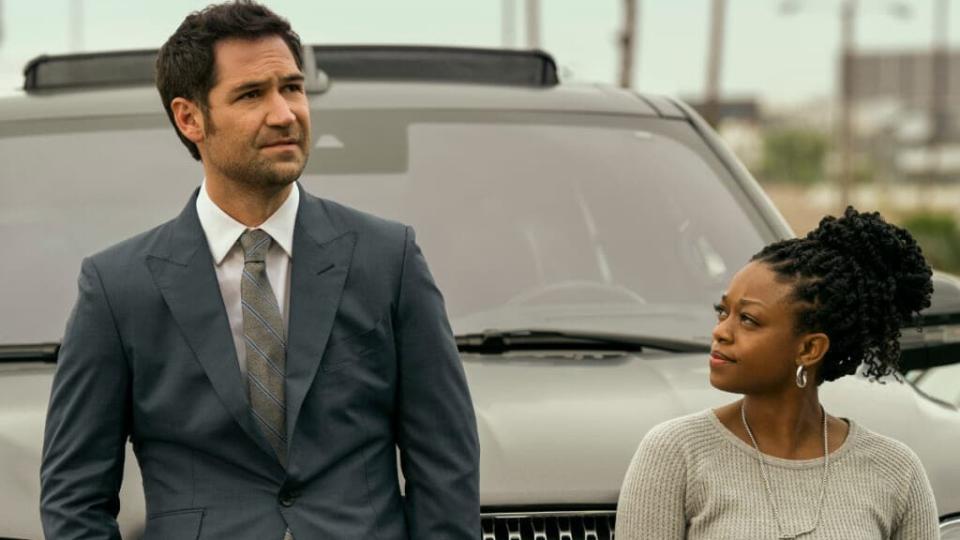‘The Lincoln Lawyer’ Review: Netflix Goes Traditional in Uninspired Drama Series
- Oops!Something went wrong.Please try again later.
- Oops!Something went wrong.Please try again later.
- Oops!Something went wrong.Please try again later.
“The Lincoln Lawyer” is not the type of show that Netflix is usually known for. Converting bestselling mass-market book series into serialized TV is a niche that competitor Amazon has thus far owned — they already have two “Bosch” series centered around another character created by “Lincoln Lawyer” novelist Michael Connelly, the ongoing “Jack Ryan” as well as fellow book-turned-early-2010s-movie-turned-show “Reacher.” On top of that, this “Lincoln Lawyer” series was originally developed for CBS before COVID-19 delays and dissatisfaction with the pilot landed the show at Netflix. It’s even guided by an old network TV pro: David E. Kelley, known for his work on legal shows like “L.A. Law,” “Ally McBeal,” and “The Practice,” among others.
None of this is necessarily a bad thing. In fact, a lot of Netflix shows could use the discipline of old-fashioned network programming, and in that sense “The Lincoln Lawyer” combines the best of both worlds: a shorter season (a cable-and-streaming standard 10 episodes, rather than a network-friendly 13-to-20) with crisp, network-friendly runtimes (closer to 45 minutes than 60). But in its passable, uninspired watchability, the show hews closer to the middle of the pack, if that.
Like “Reacher,” the TV version of “Lincoln Lawyer” suffers a bit from its previous incarnation high-wattage movie-star glow. In the 2011 movie, Matthew McConaughey played endlessly mobile Los Angeles defense attorney Mickey Holler, who prefers to work out of his car — hence the “Lincoln” moniker. It’s not exactly that series lead Manuel Garcia-Rulfo isn’t up to the job as Mickey; he’s likable, and the series makes some interesting tweaks to the character’s background to make him less of a generic white guy. There just isn’t much tension in Garcia-Ruflo’s performance; McConaughey naturally plays a slickster you like in spite of any skepticism, while Garcia-Ruflo’s Mickey seems like a stand-up guy from the jump. There’s relatively little moral ambiguity in play.
The show labors to insist otherwise, trying to convince the audience that Mickey’s personal and professional life is saturated with chaos and murk. The season, based on Connelly’s novel “The Brass Verdict,” opens with Mickey out of the law game, having just battled an addiction to painkillers. He’s drawn back into his profession when he unexpectedly inherits a practice from a friendly acquaintance — who’s also a brand-new murder victim. That murder entwines with the high-profile trial of tech mogul Trevor Elliott (Christopher Gorham), providing the season’s narrative backbone.
The story thread also weirdly undercuts the character’s central gimmick by giving Mickey an unwanted traditional office, also passed on from his colleague. He does still zip around L.A. from court to client and back again, driven by makeshift chauffeur and fellow recovering addict Izzy (Jazz Raycole), giving him the opportunity to explain various elements of his job to his sharp sidekick (and, of course, the audience). Early on, other bits of business from Mickey’s inherited practice offer glimpses of smaller-scale clients, but the appealing framework for cases of the week is largely ignored, per the current television style.
Within that serialized style, “The Lincoln Lawyer” is an easy-enough watch. Kelley brings professionalism to the project, though not the quirkiness of his best-loved shows; the dialogue is full of verbal clichés and lazy shorthanding (including semi-nonsensical cracks about millennials from characters who are either millennials themselves, or months away from qualifying).

The bigger problem — and one more at odds with Kelley’s past strengths — is that Mickey isn’t all that interesting. All of his supposed personal failings are softened and mitigated: Yes, he has two ex-wives, prosecutor Maggie (Neve Campbell) and his chipper gal-Friday assistant Lorna (Becki Newton), but he’s on good-to-great terms with both of them, while pining for a return to domesticity with Maggie and their daughter Hayley (Krista Warner).
His addiction is left almost entirely off-screen, and his efforts to “stay clean” mostly involve him attempting to avoid alcohol, just to be safe — even in recovery, he goes above and beyond! His defense-attorney work is sometimes described as opportunistic, but has a clear moral foundation. Any allegedly sketchy practices are consigned to eye-openers like lawyers trying to skew juries in their favor during selection.
Some of this is still pretty fun. In fact, that jury-selection sequence in the fifth episode is a brisk highlight, despite its familiarity. But there have been a lot of shows about lawyers, so it’s hard to get excited about an itinerant hotshot who’s actually a level-headed good guy with an office, or plot twists that arrive with clockwork regularity rather than genuine panache.
By the time the ten-episode season is over, “The Lincoln Lawyer” has passed the time without bothering to make much of a case for itself.
“The Lincoln Lawyer” is now streaming on Netflix.

